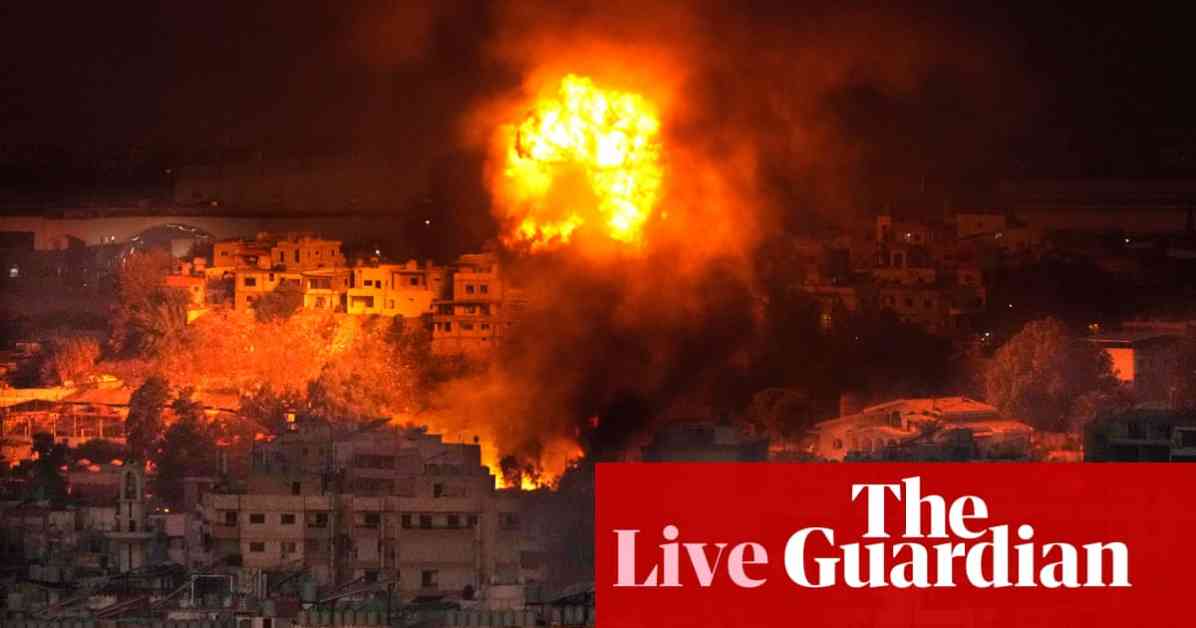Israel Strikes Hezbollah Leader Nasrallah in Escalating Middle East Conflict
In a shocking development, the Israeli army has officially announced the killing of Hezbollah leader Hassan Nasrallah. Nasrallah, who had led the Iran-backed militant group for 32 years, was reportedly targeted in Friday’s strikes on Beirut. This marks a significant escalation on the Israeli side, as they had previously refrained from targeting the group’s top leaders. However, recent months have seen Israel taking out several senior members of Hezbollah, including Nasrallah.
Under Nasrallah’s leadership, Hezbollah has played a pivotal role in training fighters from Hamas and militias in Iraq and Yemen. Additionally, the group has been accused of acquiring missiles and rockets from Iran to use against Israel. The IDF’s announcement of Nasrallah’s death signifies a major blow to Hezbollah’s operations and capabilities.
The Israeli Defense Forces (IDF) released a statement declaring that Nasrallah “will no longer be able to terrorize the world.” This move comes in the midst of escalating tensions in the Middle East, with conflicts involving Hamas in Gaza and now Hezbollah in Lebanon.
Israeli Military Strikes on Beirut
The Israeli military claimed that Nasrallah was killed alongside other Hezbollah commanders in the strikes on Beirut. The military stated that the attacks targeted Ali Karake, identified as the commander of Hezbollah’s southern front, and several other high-ranking members of the group. The IDF’s statement accused Nasrallah of being responsible for numerous terrorist activities and attacks against Israeli civilians and soldiers.
Israeli Defense Forces chief, Herzl Halevi, addressed the confirmation of Nasrallah’s death by stating, “Whoever threatens the state of Israel, we’ll know how to get to him: in the north, in the south, and in more distant places.” Halevi emphasized that the IDF is prepared on all fronts and hinted at the possibility of more actions to come.
The strikes on Beirut have forced thousands of residents to flee their homes, seeking refuge in public spaces like Martyrs’ square and makeshift shelters. The scenes of chaos and destruction in Beirut have left many questioning the motives and consequences of Israel’s aggressive actions.
Impact on Lebanese Civilians
The heavy Israeli airstrikes on Beirut’s southern suburbs have led to a massive displacement crisis, with thousands of residents forced to evacuate their homes. Reports from the ground describe a harrowing night of bombings and destruction, with families seeking shelter in public areas amidst the chaos.
One resident, Hawra al-Husseini, recounted the terrifying experience of fleeing her home in Dahiyeh to seek safety in Martyrs’ square. She described the screams of children and the fear that now grips the community, questioning the rationale behind the attacks on civilian areas.
Another displaced resident, Hala Ezzedine, expressed her disbelief and frustration at the ongoing cycle of violence in the region. Having experienced the destruction of her home during the 2006 war, she voiced her concerns about the future and the impact of the current conflict on innocent civilians.
The Lebanese health ministry reported six deaths and numerous injuries as a result of Friday’s attacks, with the toll expected to rise as rescue efforts continue. Hospitals in Beirut’s southern suburbs are being evacuated to accommodate the influx of casualties, highlighting the humanitarian crisis unfolding in the wake of the Israeli strikes.
Regional Escalation and International Response
The strikes on Beirut come amidst escalating tensions in the region, with Hezbollah retaliating by launching rockets at Israeli cities in the north. The back-and-forth attacks between Israel and Hezbollah have raised concerns about the potential for a wider regional conflict involving Iran and other players in the Middle East.
World leaders, including US President Joe Biden and EU foreign affairs chief Josep Borrell, have expressed their concerns over the escalating violence and called for a ceasefire in the region. The UN Secretary General, António Guterres, has reiterated the need for a peaceful resolution to the conflict, emphasizing the importance of ending the cycle of violence in Gaza and Lebanon.
The international community’s response to the crisis has been mixed, with some condemning Israel’s actions and others expressing support for the country’s right to defend itself against militant groups like Hezbollah. The situation remains volatile, with the potential for further escalation and widespread ramifications for the region.
In conclusion, the killing of Hezbollah leader Hassan Nasrallah in the Israeli strikes on Beirut represents a significant escalation in the ongoing conflict in the Middle East. The targeting of high-ranking members of Hezbollah and the resulting displacement of Lebanese civilians underscore the devastating impact of the violence on innocent lives. As tensions continue to rise and regional powers weigh in on the situation, the need for a diplomatic solution and a lasting peace becomes more urgent than ever.












